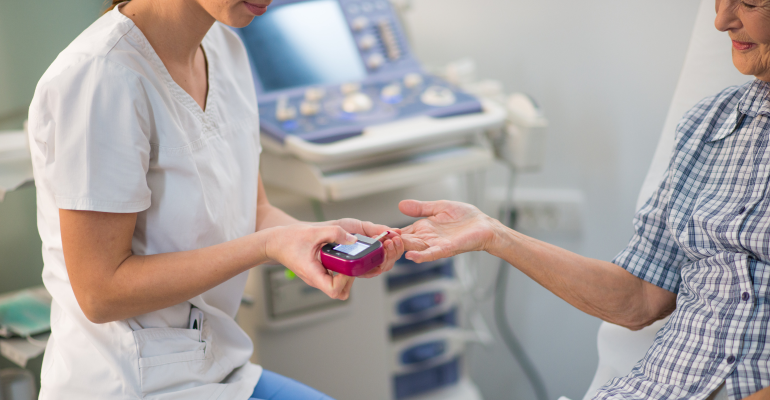Healthcare professionals and systems are facing increasing pressure as the estimated number of people living with diabetes worldwide stands at 537 million. Projections suggest this figure could rise to 783 million by 2045. However, cutting-edge tools and new technology are redefining the future of diabetes care and are set to alleviate this pressure by streamlining processes, enhancing patient care, and ultimately enabling patients to take more control.
The rise of smartphones, remote monitoring and new diabetes devices continue to positively impact diabetes management. During the recent American Diabetes Association's 83rd Scientific Sessions, Glyconics Ltd. introduced the Glyconics-DS which offers needle-free diabetes testing with infrared technology, providing a quick risk assessment based on fingernail blood sugar levels.
Fractyl Health Inc. also demonstrated the efficacy of their Revita procedure in lowering blood glucose levels and encouraging weight loss. The Revita procedure, an FDA breakthrough, utilises endoscopic hydrothermal ablation to rejuvenate the duodenum's surface. Developed by Fractyl in Lexington, Massachusetts, it is designed for use in conjunction with empagliflozin, an SGLT-2 medication for type 2 diabetes. Preliminary results from the Revitalize 1 study, presented at the ADA meeting, showcased significant improvements.
Related: The rise of diabetic tech is revolutionising healthcare delivery
Dr. Omar Dhaimat, an expert in the field of diabetes and Consultant Endocrinologist at Clemenceau Medical Center Hospital Dubai, explains how technology is helping the health sector to manage this pandemic.
“Until we reach the stage of a fully automated artificial pancreas, using various technology devices in monitoring the glucose and delivering insulin, is a major milestone. Using continuous glucose monitoring devices (CGMs) and having access to them remotely has helped ease the pressure and workload on the health sector and has improved the outcome of managing diabetes for patients. There have been many studies to show the benefit of those devices on HBa1c control, patient satisfaction and better outcomes. Using telemedicine and having access to those monitoring devices have also improved the care of patients.”
Telemedicine and teleconsultation platforms provide an excellent layer of support, enabling healthcare professionals to engage in virtual consultations and enhancing convenience for both patients and providers. This innovative approach significantly reduces the logistical burdens associated with in-person visits, offering welcome respite for patients.
More advanced technology delves into data analytics and predictive insights, combing through extensive datasets to reveal intricate patterns in a patient's glucose levels. Armed with this knowledge, healthcare professionals can detect potential issues and intervene, ultimately reducing the number of emergency medical visits.
Technology plays a vital role in empowering patients by equipping them with educational and self-management tools. This enables patients to make informed decisions and lessens their reliance on constant guidance. Dr. Dhaimat elaborates on the various ways technology has enhanced self-management in diabetes care.
“Firstly, to monitor the glucose level for 24 hrs per day, generates what we call ‘time in range’, so the health professional will know what happens to the glucose levels all the time. That will lead to adjusting the management of diabetes during the day. It will also alert the patient and the health care provider about low glucose levels and try to avoid having severe hypoglycaemia, which is a potentially lethal complication.”
Related: Diabetes prevention remains UAE’s top priority
Dr. Dhaimat says better monitoring will lead to lower HBa1c and less risk for future complications. “Diabetes affects the kidneys, eyes, cardiovascular system, and the nerves. Better monitoring, ultimately will prevent those complications from happening. Finally, the communication between the healthcare provider and the patient is much easier. Since they both have access to the monitoring device and can provide assistance in real-time.”
Dr. Dhaimat, highlights the remarkable progress already witnessed in diabetes management. He notes that significant advancements, such as automated insulin pumps equipped with sensors to detect hypoglycemia and even administer glucagon when needed, have transformed treatment. The emergence of insulin patches with their own reservoir, controllable through smartphones, represents a significant step forward. Dr. Dhaimat believes we are on the brink of achieving the long-anticipated closed-loop insulin pump system. He also highlights the option of pancreatic beta cell and pancreas transplantation, which are now viable solutions in specific cases. In essence, technology can ease the workload of healthcare professionals, enhancing patient care quality and allowing experts to focus their expertise on complex cases.
According to Dr. Dhaimat, within the next decade, a significant shift is anticipated, where all diabetic patients will transition to AI-based management. Through the identification of optimal algorithms, diabetic individuals will gain the ability to proactively anticipate their glucose levels, enabling them to take early corrective actions. Dr. Dhaimat states that AI is poised to redefine the future of diabetes care, potentially eliminating the necessity for in-person doctor visits, as all aspects of care could be efficiently administered remotely. This transformative approach holds the promise of enhancing the overall quality of life for diabetes patients while reducing the risks associated with complications.
Get the latest insights from the healthcare industry straight to your inbox. Subscribe for a bi-weekly roundup of the latest healthcare tech, trends, innovation and patient experience, accompanied by exclusive interviews from the industry’s leaders.


